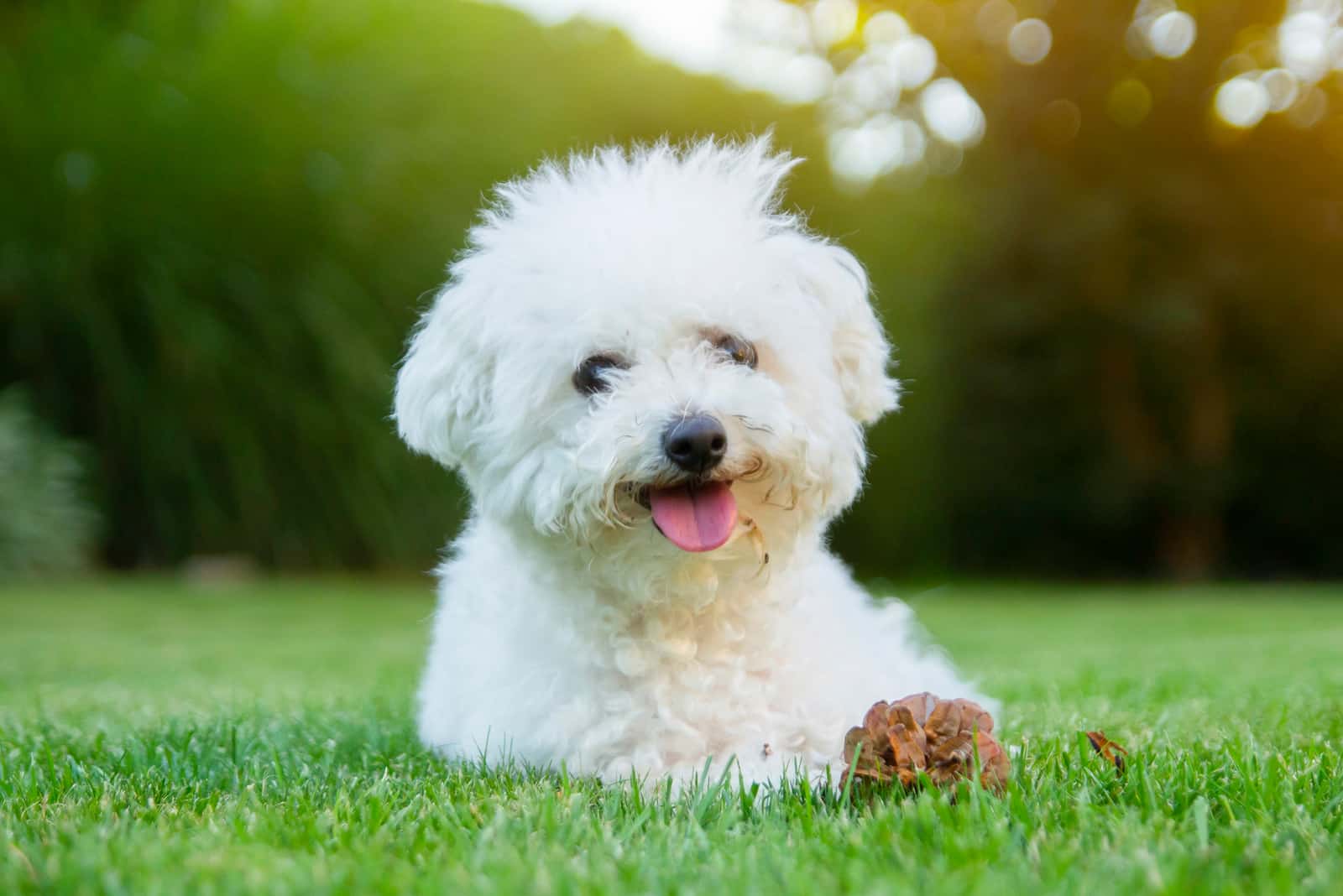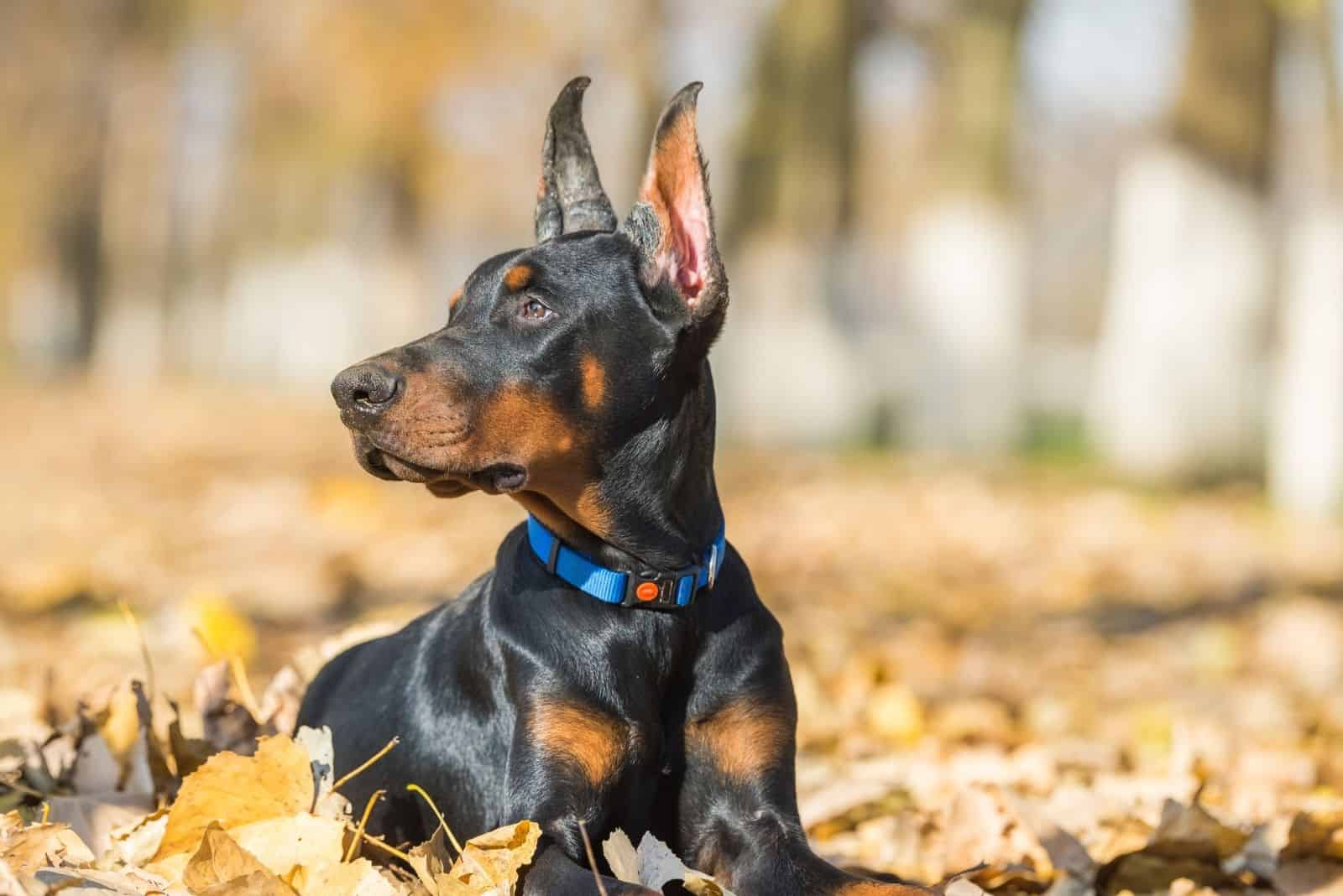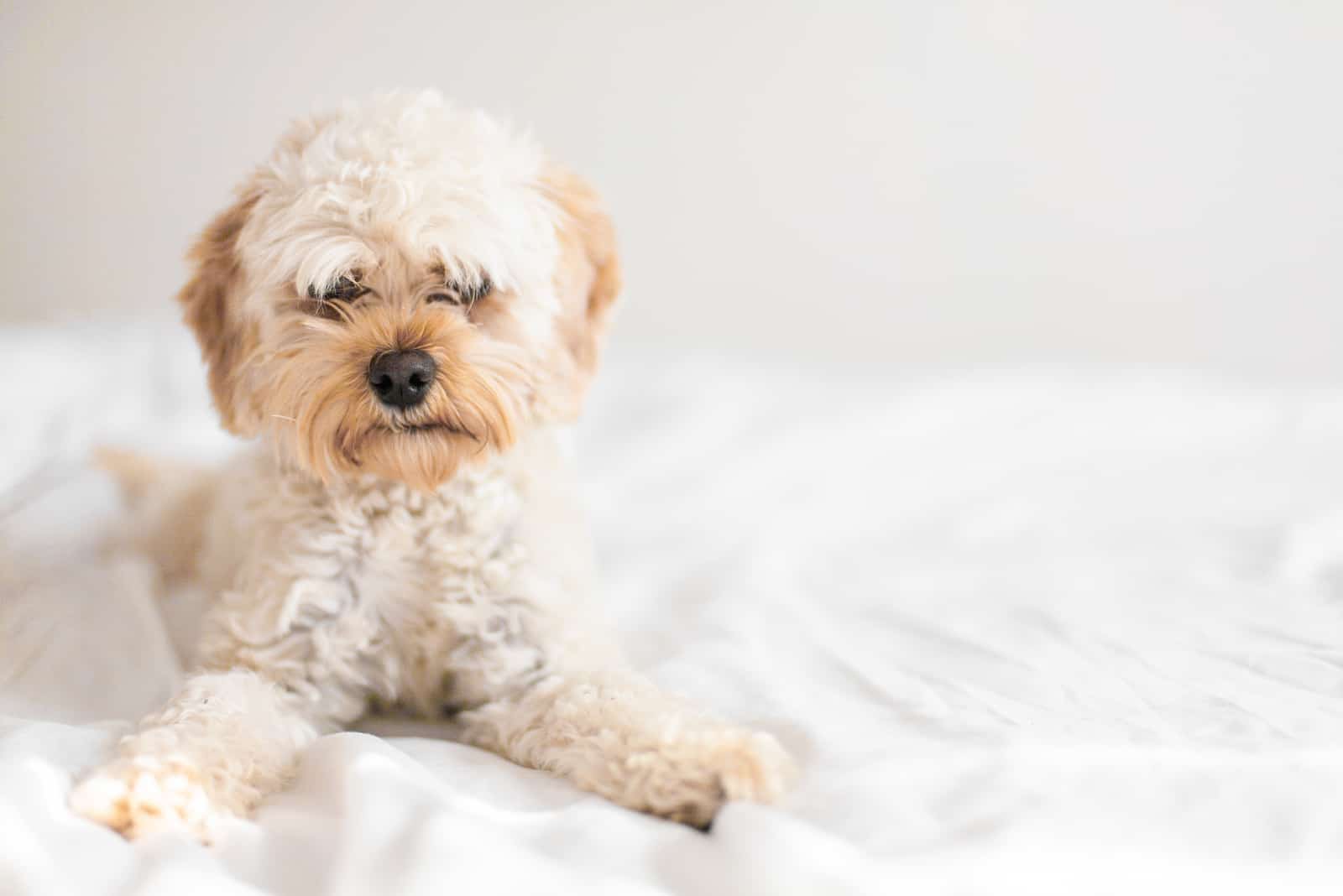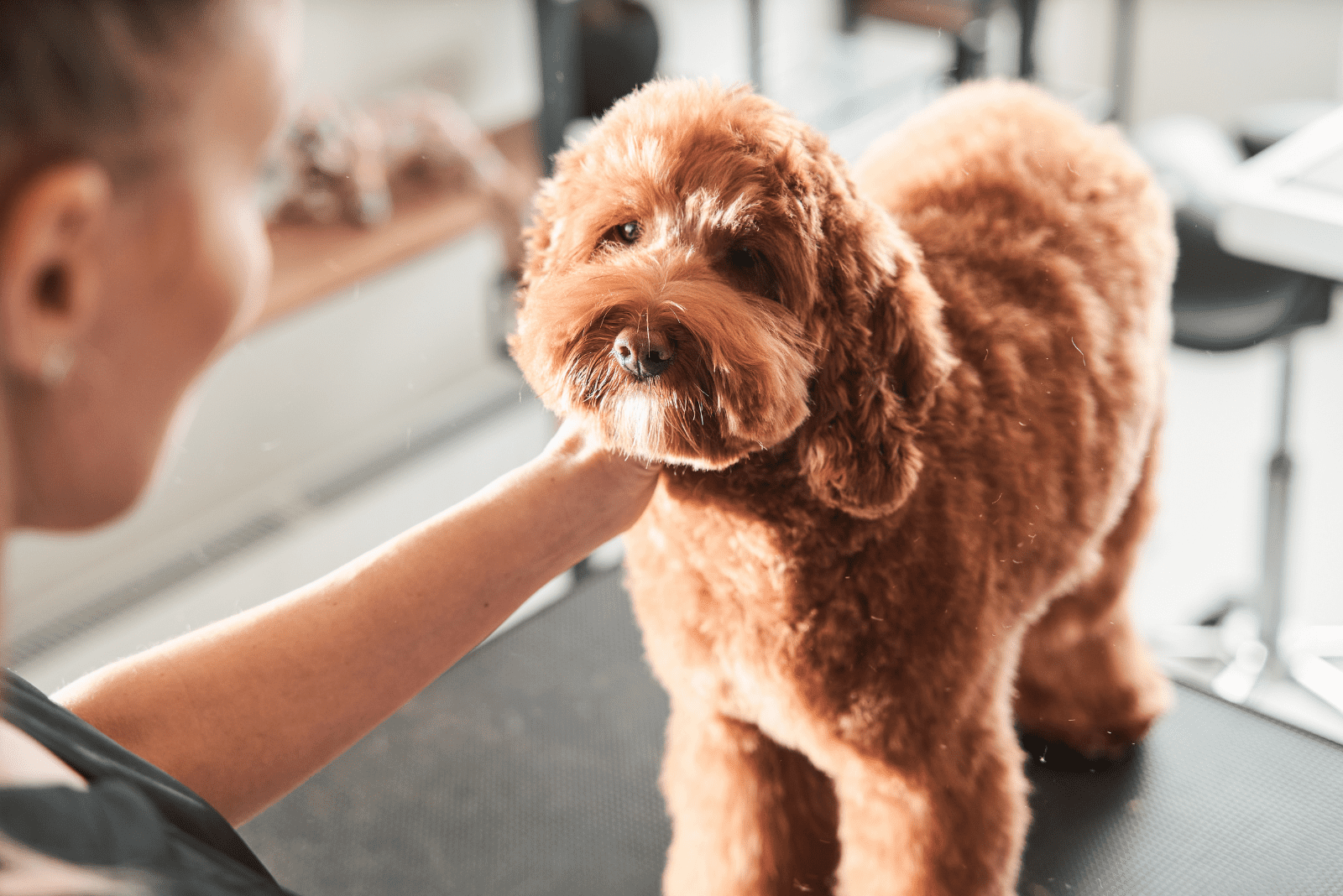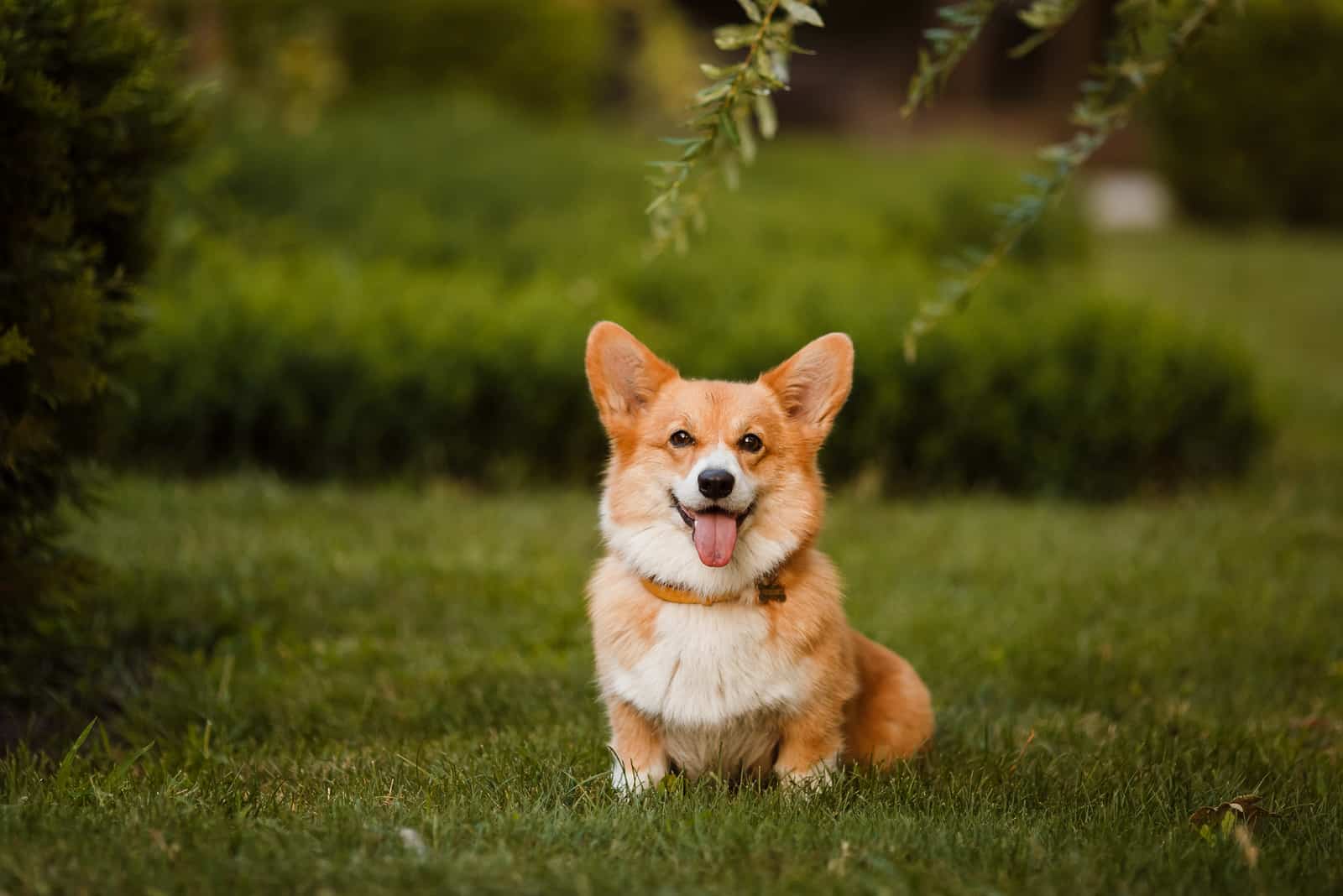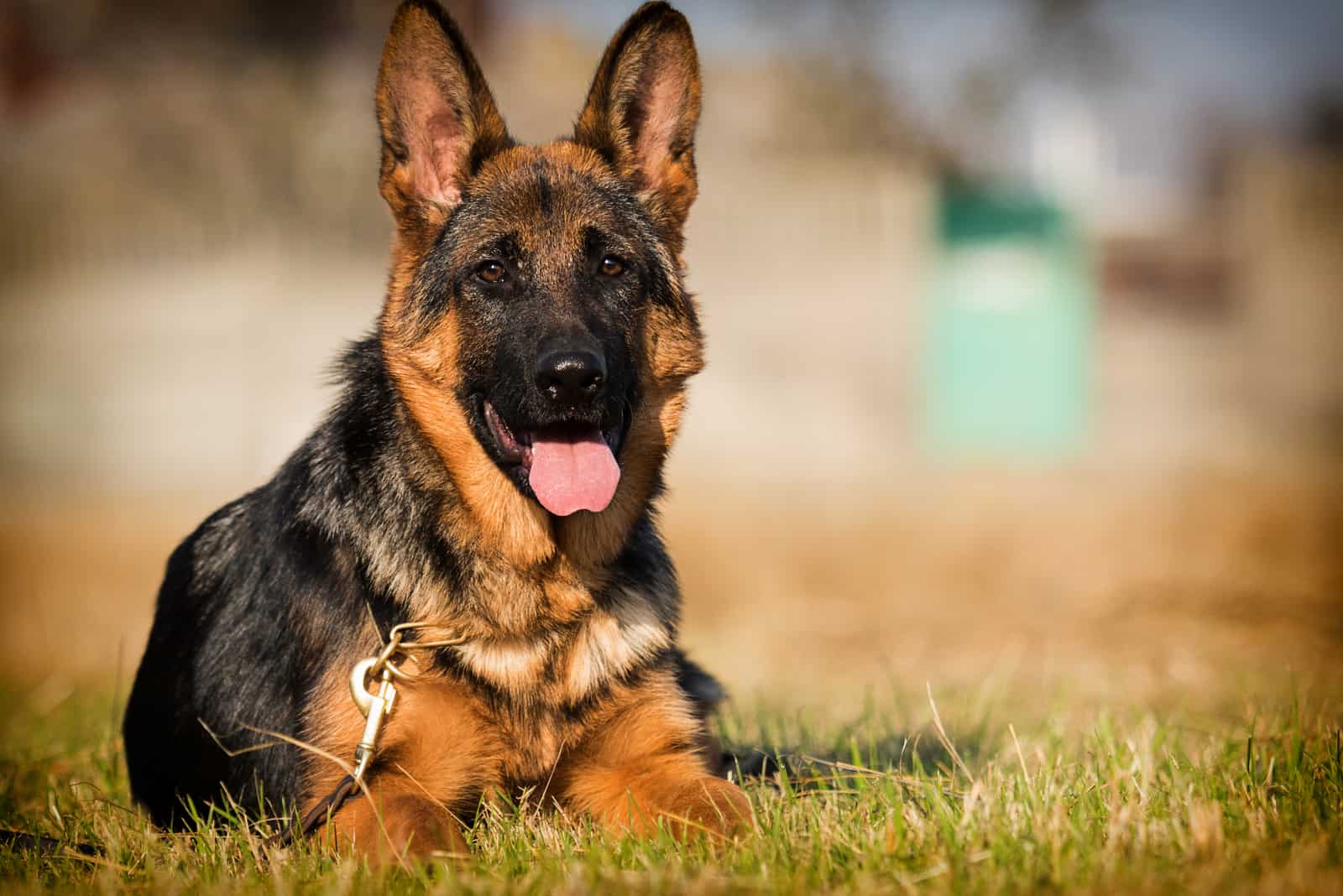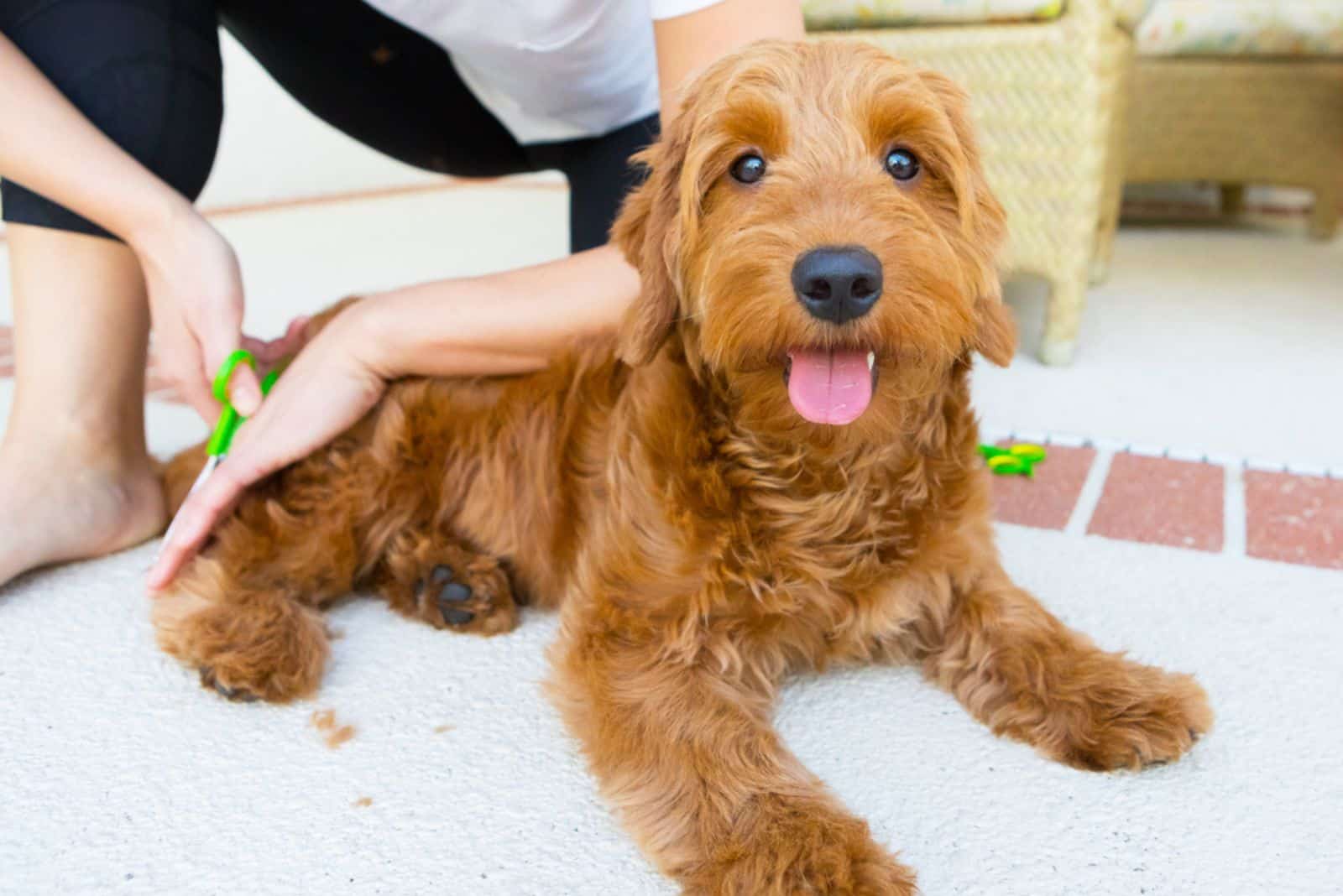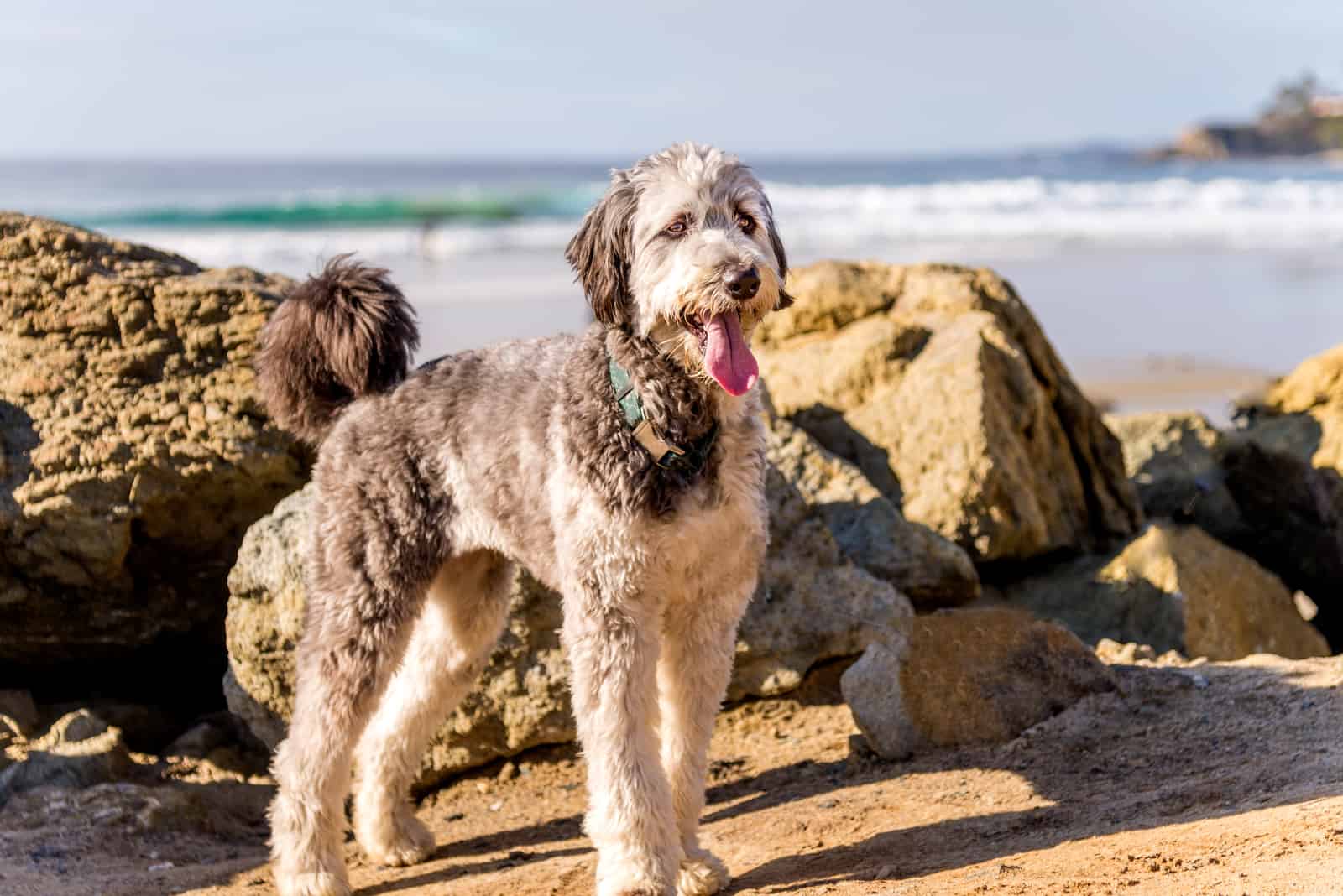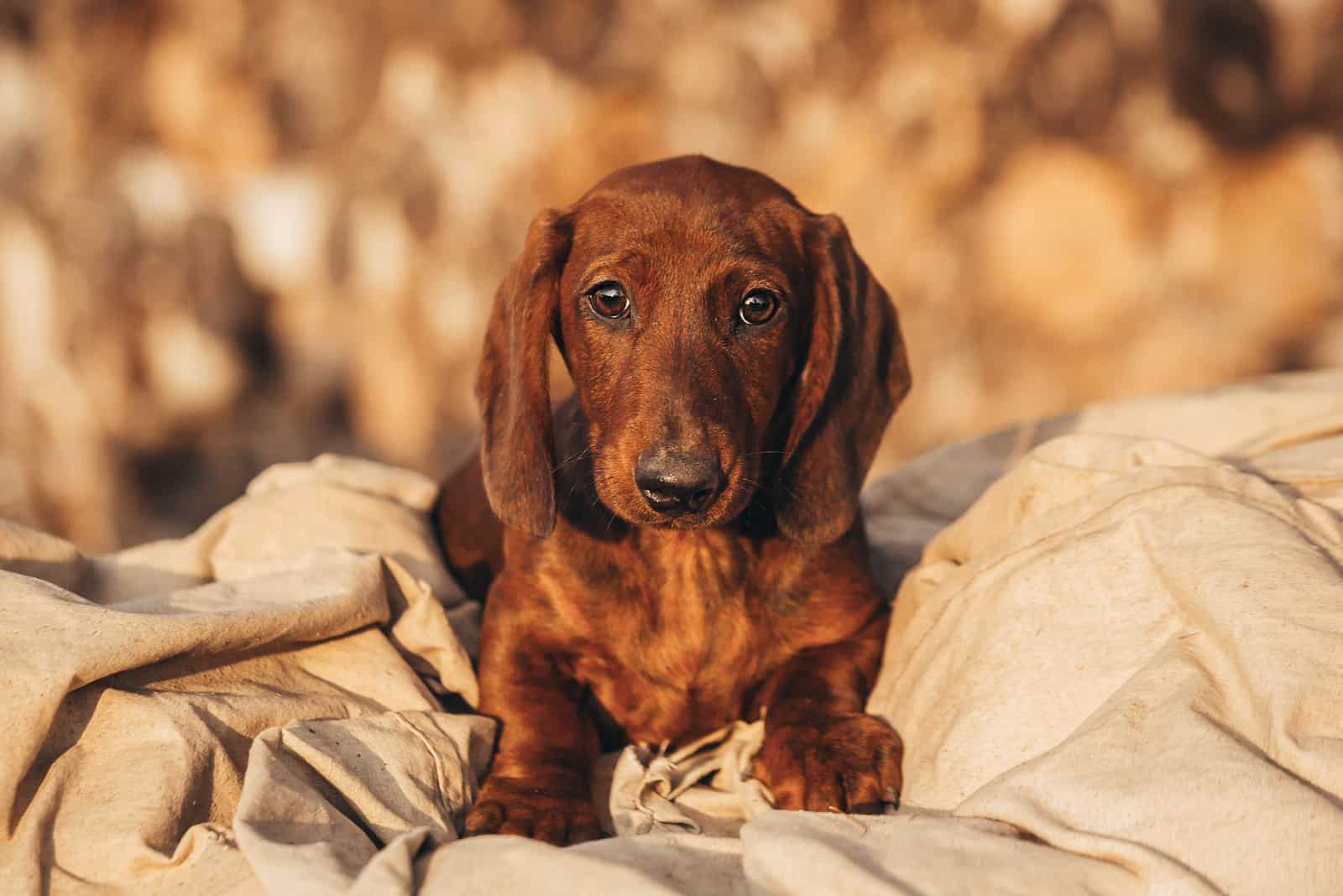“Are Yorkies hypoallergenic?” It’s a reasonable enough question, isn’t it? You can find plenty of one-word answers when you Google this question.
However, there’s a lot of false information and advice out there based on ignorance and misunderstanding. Surprisingly, even some websites run by animal experts and major kennel clubs contain errors or display an evident lack of understanding of the facts.
So, we’re here to clear things up once and for all.
First, let’s get this straight: Yes, Yorkshire Terriers are hypoallergenic!
Now we should really explain our answer so that you better understand what pet allergies are all about.
Why Does It Matter?

It’s estimated that between 15 and 30% of Americans suffer from a pet allergy of some kind. Although more people are allergic to cats, allergic reactions to dogs tend to be more severe.
This is particularly so for anyone who suffers from asthma, as they face an increased risk of serious complications.
Also, an extreme allergic reaction can cause anaphylaxis, where the body goes into shock. As well as the usual signs of an allergy, like the runny nose, sneezing, and itchy eyes, anaphylactic shock causes breathing difficulties and can affect the heart.
One of the most dangerous symptoms is that the throat, lips, and tongue can swell, restricting airflow to the lungs.
Thankfully, pet allergies rarely cause such a bad reaction, but it’s best to be aware and be prepared. Many people with severe allergies carry an adrenaline injector in case of emergencies.
Almost 70 million households in America are dog owners, so you can see why people would be interested in learning about hypoallergenic dog breeds!
This situation is likely to be similar in other countries, making the idea of a low-allergy dog very attractive.
So, we’ve answered the question, Are Yorkies Hypoallergenic? But what exactly is a hypoallergenic dog?
Hypoallergenic Dogs: The Facts
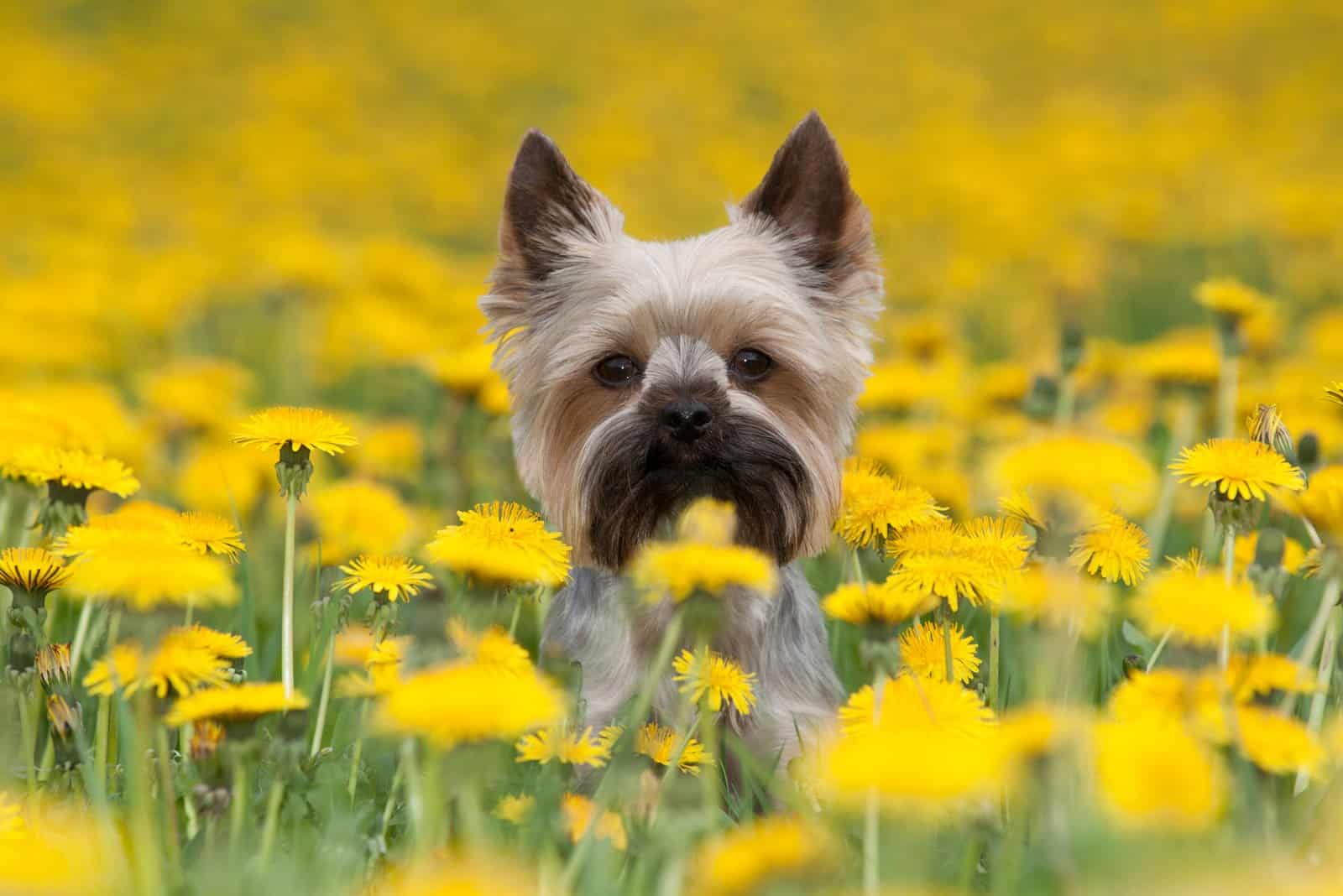
You’ve probably seen a whole load of information about dog allergies on the web or been given ‘advice’ from well-meaning friends.
Sadly, much of this is useless nonsense. While that may seem a bit strongly worded, it’s the truth. Here are a few examples of what people say:
• There’s no such thing as a hypoallergenic dog
• The Poodle is 100% hypoallergenic
• No breed is 100% hypoallergenic
• My dog is allergy-free
• Vacuuming gets rid of the problem
• Clipping your dog’s hair stops allergies
• People are allergic to dog hair
Although there’s a grain of truth in some of these claims, they’re basically all false or misleading.
Let’s examine them one by one.
First off, there is such a thing as a hypoallergenic dog! Those that claim otherwise do not understand what the word means. Anything hypoallergenic, whether it’s bedding, jewelry, or medical equipment, is designed to have a decreased risk of triggering allergy symptoms.
All this means is that you are less likely to experience an allergic reaction. Therefore, a dog less likely to trigger allergies is considered hypoallergenic. Pretty simple, really!
Now we should deal with the following two claims as they are connected. It’s impossible for any dog to be 100% hypoallergenic as this quality can’t be measured in this way.
If it was possible, you could label a dog as 35%, 55%, or 70% hypoallergenic! Therefore, you can’t have a 100% hypoallergenic dog, as this is like saying the dog is 100% less likely to induce allergies.
On the other hand, those who say ‘no breed is 100% hypoallergenic‘ also misuses the word. It isn’t about quantity; it’s about whether it’s less likely to trigger allergies.
Likewise, you can’t have an allergy-free dog. All dogs can potentially cause allergies, even those labeled hypoallergenic. It all depends on the individual and the severity of their allergy.
Moving on to vacuuming, this is a good idea but is pretty pointless if you don’t have a HEPA filter fitted. No matter how powerful, a regular vacuum cleaner will simply stir up dust and possibly make things worse.
As for clipping your dog, grooming is an essential part of your dog’s care regime and should be done frequently to keep its coat in good condition.
Regular brushing will make a difference, but clipping their coat won’t help unless it’s part of an overall plan to reduce the impact of allergies (see the section with tips to minimize allergies below).
You could shave your dog completely (please don’t!), but you’d still suffer from your allergy.
Why is this? Let’s look at the next false claim, which states that dog hair causes the problem.
The real culprit is dander, which is a bit like dandruff (but not exactly the same). These dry flakes of dead skin contain proteins. The same proteins are found in dog saliva, urine, and feces. Dander is light enough to float around your home where it can be breathed in.
And once it’s in your nose or mouth, it sets off an allergic reaction.
How does this fit in with our answer to the question, Are Yorkies hypoallergenic?
Well, you’ll have to continue reading to find out!
What Causes Pet Allergies?
We singled out the main culprit responsible in the previous section: dander.
These dry skin flakes fall off your dog’s skin where they either stick to dead hairs on the dog’s coat or fall off and float about the room.
When allergy sufferers come into contact with this (usually in the eyes, nose, and mouth), their immune systems overcompensate, mistaking the proteins to be harmful bacteria or a virus.
The immune system then sends a signal to the brain to produce histamine, increasing mucus production, constricting blood vessels in some areas, and causing swelling and irritation.
This is all designed to expel the ‘harmful’ invader and allow the immune system to repair any damage to cells. The trouble is that it causes swelling, sneezing, itchy eyes, and nasal congestion. And it’s not much fun!
In some cases, the particles are small enough to enter the lungs, which isn’t great for people living with asthma. An allergic reaction can cause severe breathing difficulties for these unfortunate people and can even be fatal.
How does this relate to our central theme, with the question, Are Yorkies Hypoallergenic?
We’re about to find out!
What Makes The Yorkie Hypoallergenic?
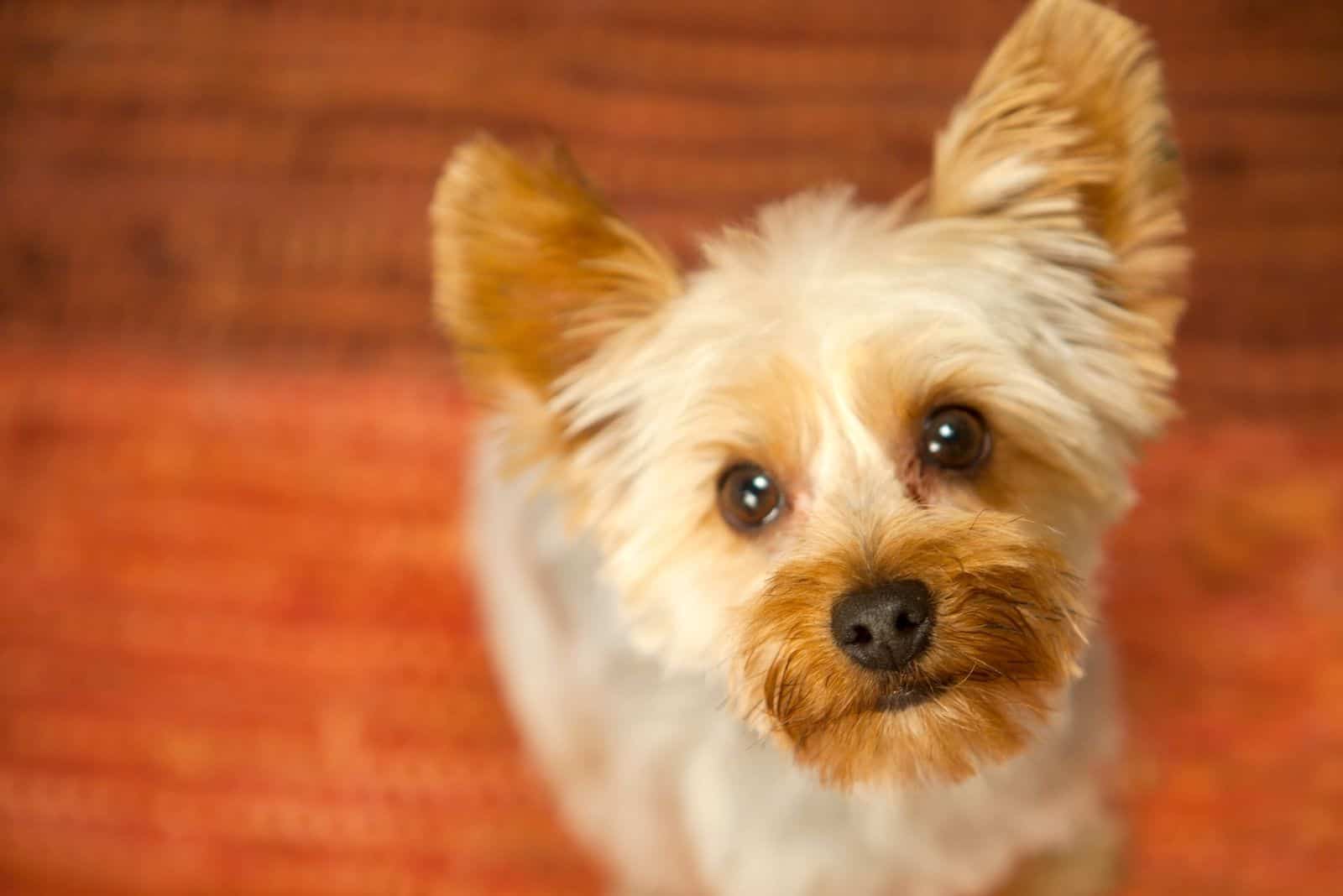
To begin with, there’s the Yorkie’s small size. The smaller the dog, the less dander they’ll produce.
Then there’s the Yorkie’s hair, which is much like human hair. In most dog breeds, the hair goes through a cycle where it grows to a certain length, stays in place for a while, then dies and falls out. Many of these breeds shed heavily in spring and fall, especially those with a double coat.
Double-coated breeds have a thick, furry undercoat covered with a weatherproof topcoat. It’s this thick fur from underneath that ‘blows’ twice a year, filling our homes with fluff that gets everywhere. And because it carries dander, it can be a nightmare for allergy sufferers!
However, the Yorkie has a single coat of long hair that keeps growing. Like us, it needs a good haircut now and then. As the hair doesn’t die and drop out, the Yorkie is considered a low-shedding dog.
This, when combined with the fact that they don’t produce much dander, makes the Yorkie an ideal choice for dog lovers with allergies.
It’s only fitting to insert a word of warning here: as mentioned above, it’s not only dander that causes the problem. Dog saliva, urine, and feces contain proteins that can trigger allergies.
Your dog will lick its coat, its food bowl, your hands, and your face. It will chew on its toys, and it may even drool (particularly when teething), resulting in a buildup of saliva. It also goes without saying that dogs clean themselves with their tongue after going to the bathroom.
Immediately, you have several potential ways that those pesky proteins can make contact with you. So, even though the Yorkie is considered a low allergy risk, you must take precautions to limit exposure to these allergens.
Are Teacup Yorkies Hypoallergenic?
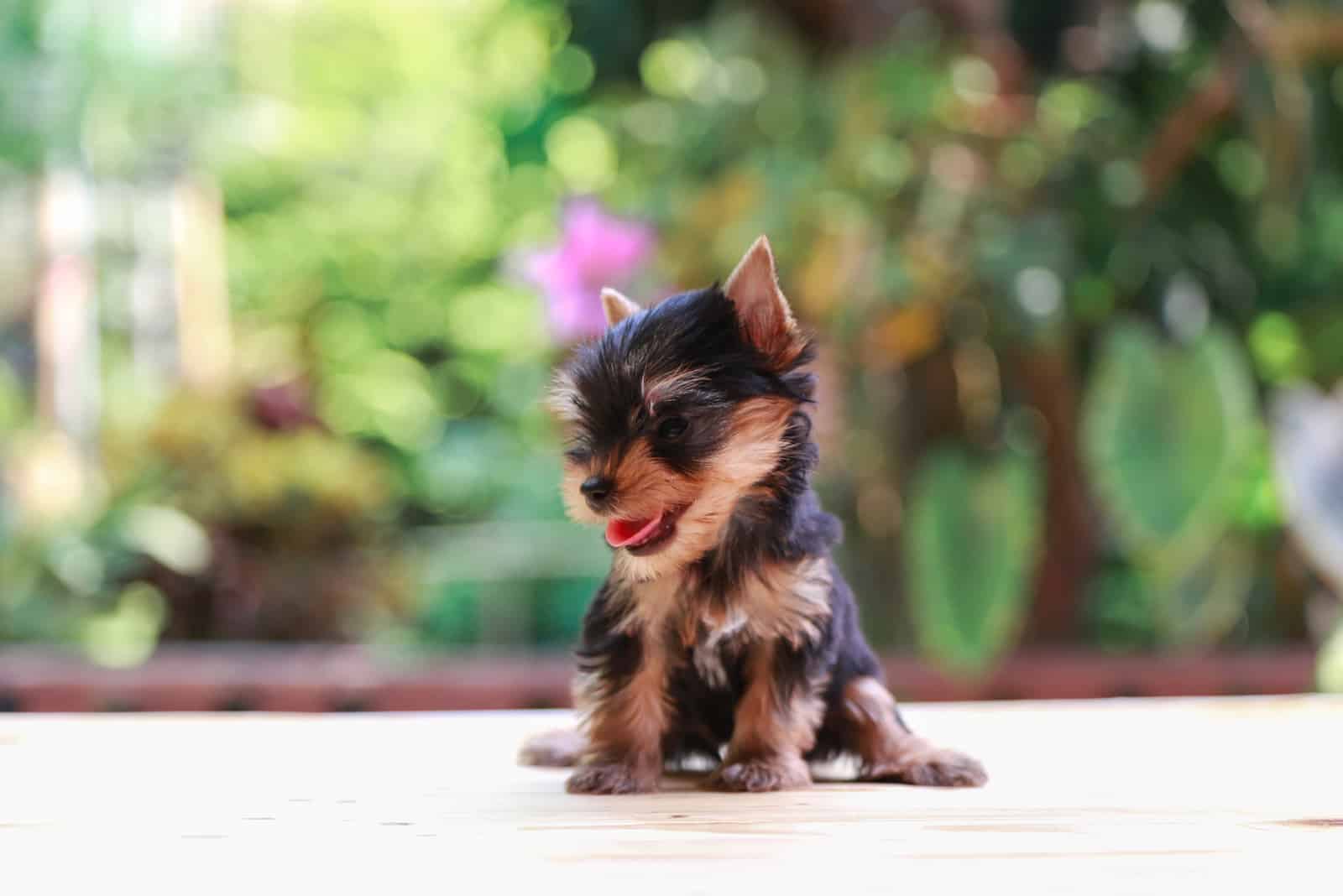
Yes, they are.
However, the real issue here isn’t the question, Are Yorkies hypoallergenic dogs?
The main focus should be on the ethics of producing teacup dogs.
It’s essential to be aware that no kennel club recognizes teacup dogs of any breed. Organizations like the American Kennel Club (AKC) do not endorse or agree with the breeding of teacup dogs as they are outside the breed standards.
It has taken decades of careful breeding to produce small dog breeds, and for most people, these are small enough.
Some breeders use unethical methods to make them smaller, such as breeding runts together or starving dogs to stunt their growth. Teacup dogs may be small, but they bring big financial rewards for unscrupulous breeders.
While these pups are undoubtedly cute, they face an increased risk of severe health issues as their bodies are unnaturally small. If you do buy one, be sure to take out pet insurance to cover some of the cost of vet bills!
Our advice is clear: avoid buying teacup Yorkies or any other undersized dog.
Furthermore, no reputable breeder ever advertises teacup dogs for sale.
Can Yorkies Give You Allergies?
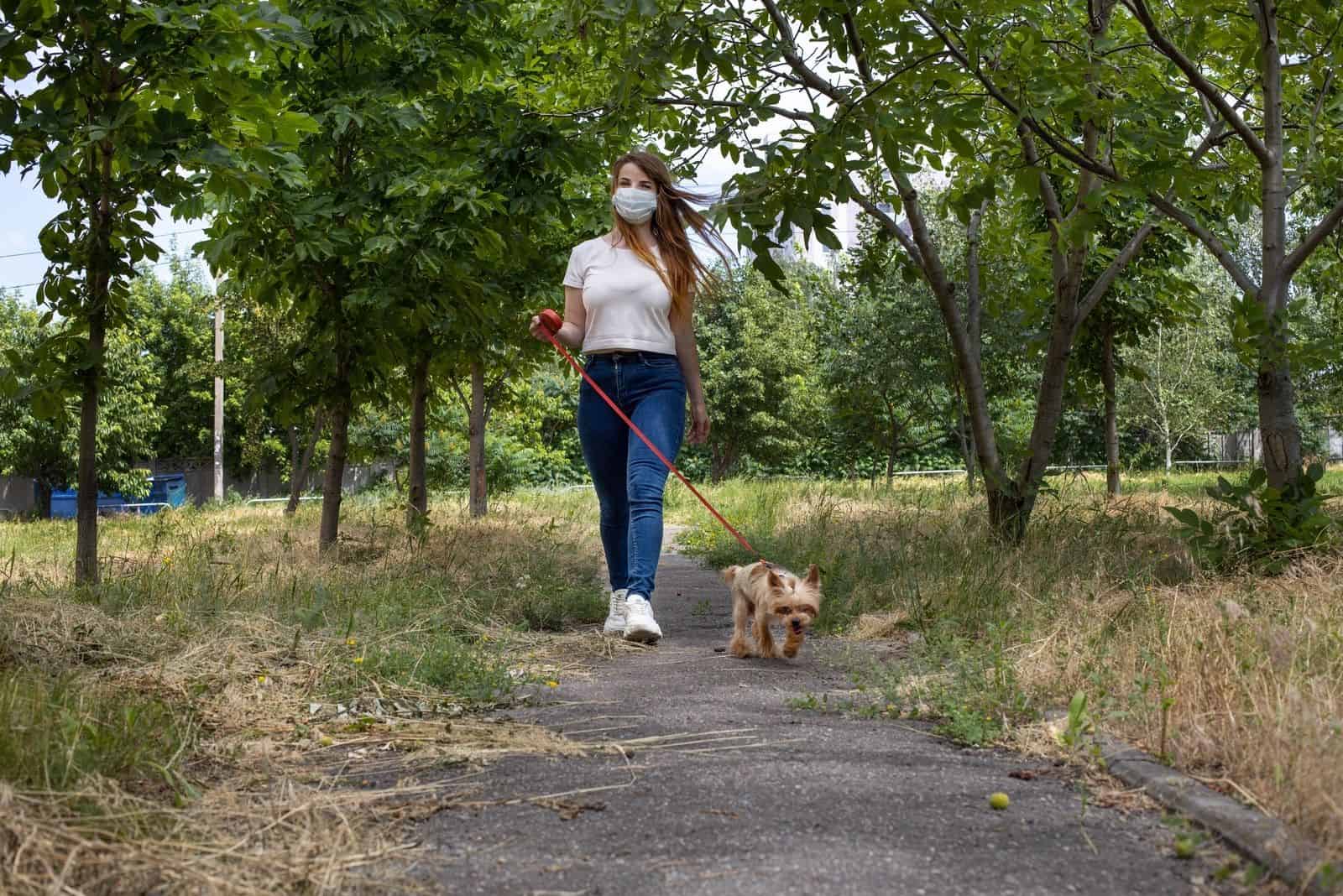
Hopefully, we already answered this when we dealt with the question, are Yorkshire Terriers hypoallergenic?
Even so, it doesn’t hurt to go over the facts again.
Yorkshire Terriers are not as likely to trigger an allergic reaction as some other breeds. However, there are no guarantees! It all depends on how severe your allergy is, and how much dander each individual dog produces.
You then need to account for the fact that the same proteins that cause allergies are present in the dog’s urine and feces. Even so, this shouldn’t be too much of a problem if any ‘accidents’ are cleared up quickly.
It’s more likely to be a problem when you’re toilet training your Yorkie puppy.
Once they reach adulthood, you’ll probably avoid coming into contact with their pee and poop – unless you’re very unlucky!
So, can Yorkies give you allergies? Without being pedantic, they can’t give you allergies, but they can certainly trigger the allergies you already have. Remember, it’s not the dog that’s causing this; it’s your own immune system that’s overreacting.
Do Yorkies Shed?
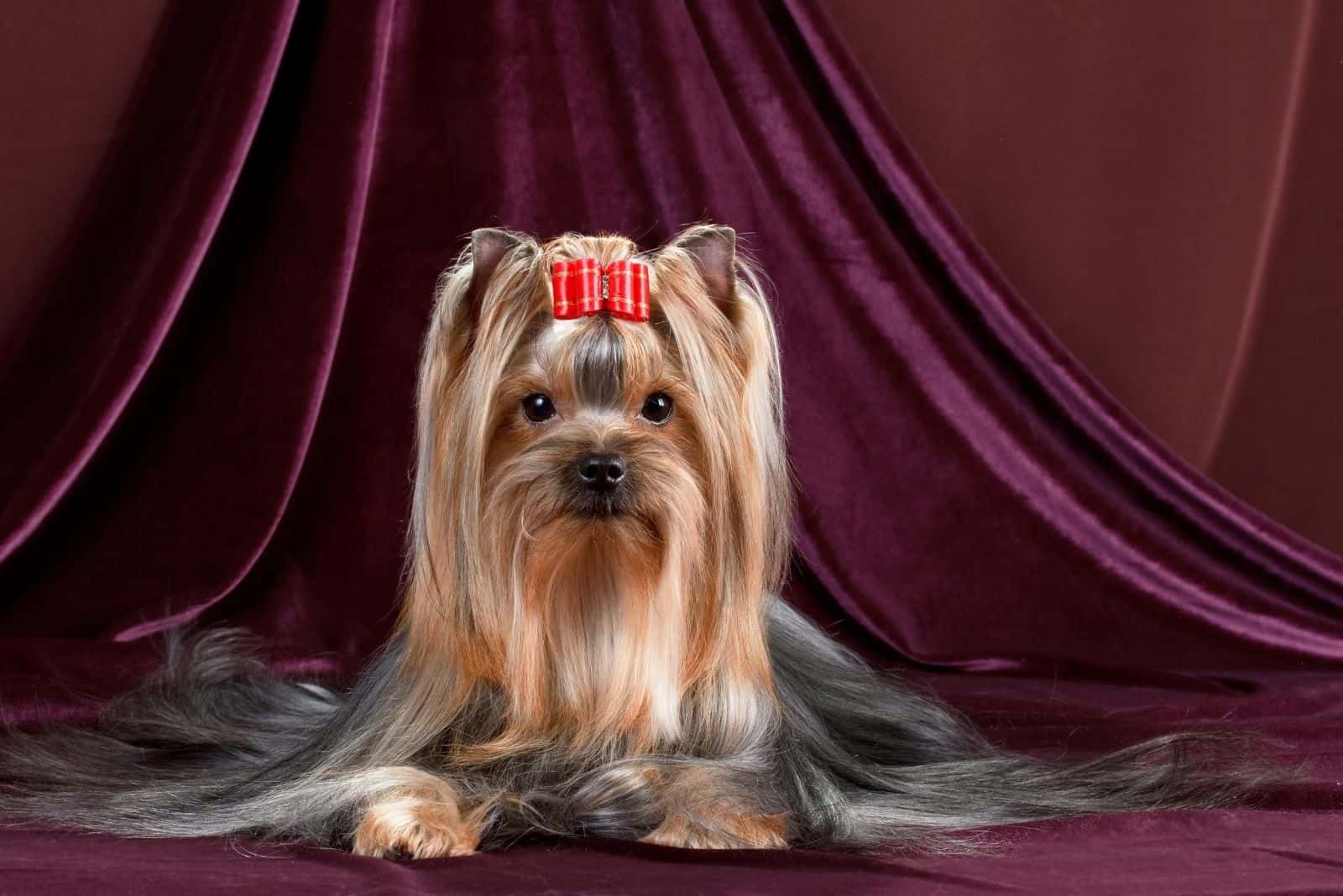
Yes, they do. Although they’re classed as a low-shedder, their hair still falls out from time to time.
Yorkies have hair rather than fur, which is one reason for them being classed as hypoallergenic. It’s mainly a dog’s fur that causes allergy problems as it is thick, lightweight, and often packed with dander!
The Yorkie doesn’t have a furry undercoat like some other dogs, so this is never an issue.
The tricky thing about the Yorkie coat is that it keeps on growing like human hair. You’ll need to get it clipped every six to eight weeks to stop it from getting too long.
On the subject of shedding, don’t be taken in by anyone who says that dogs don’t shed. Even hairless dogs shed to some extent. And in relation to allergy-friendly dogs, it’s irrelevant anyway.
It isn’t the amount of shedding that causes allergies; it’s the amount of dander that the dog produces.
What’s The Most Hypoallergenic Dog?
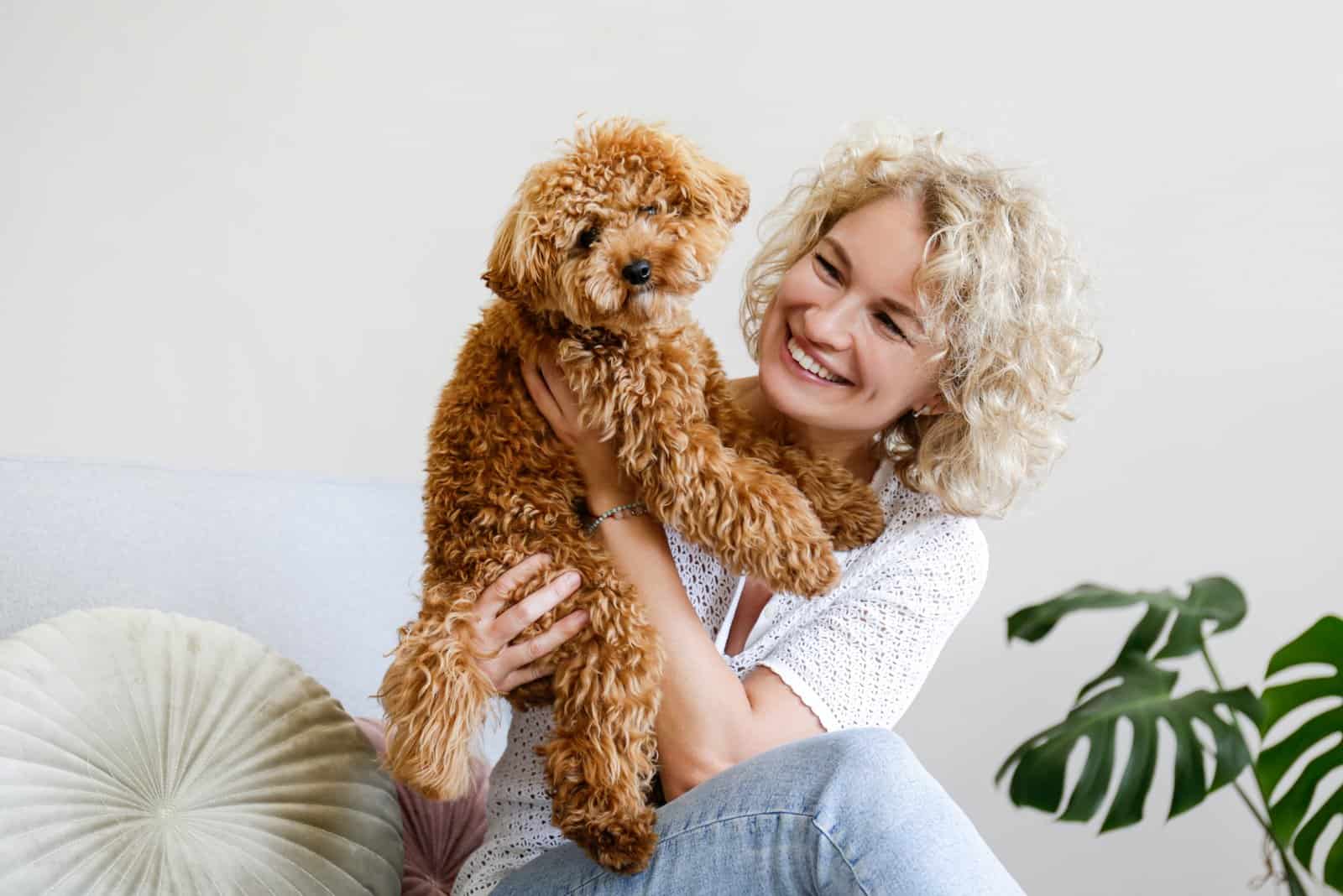
The Poodle is regularly praised for its allergy-friendly coat and has long been held as the best hypoallergenic breed.
Because of this, the Poodle has been mixed with various other breeds to produce allergy-friendly dogs.
But is it right that the Poodle hogs all the glory as the only hypoallergenic breed of dog?
Here are some alternatives:
• Schnauzer
• Shih Tzu
• Maltese
• Afghan Hound
• Chinese Crested
• Kerry Blue Terrier
• Bichon Frise
• Affenpinscher
• Irish Water Spaniel
• Portuguese Water Dog
• Spanish Water Dog
• Basenji
• Bedlington Terrier
• American Hairless Terrier
There are plenty more, but this list is a good starting place.
One thing to be wary of is when people claim to have non-shedding dogs. The fact is, all dogs shed to some extent, even so-called hairless breeds (like the Chinese Crested in our list).
At best, they should be described as low-shedding. And while we know that this can help with allergies, it’s not the main issue. It’s the dander from the dog’s skin that causes the problem!
Are Yorkie Poos Hypoallergenic?
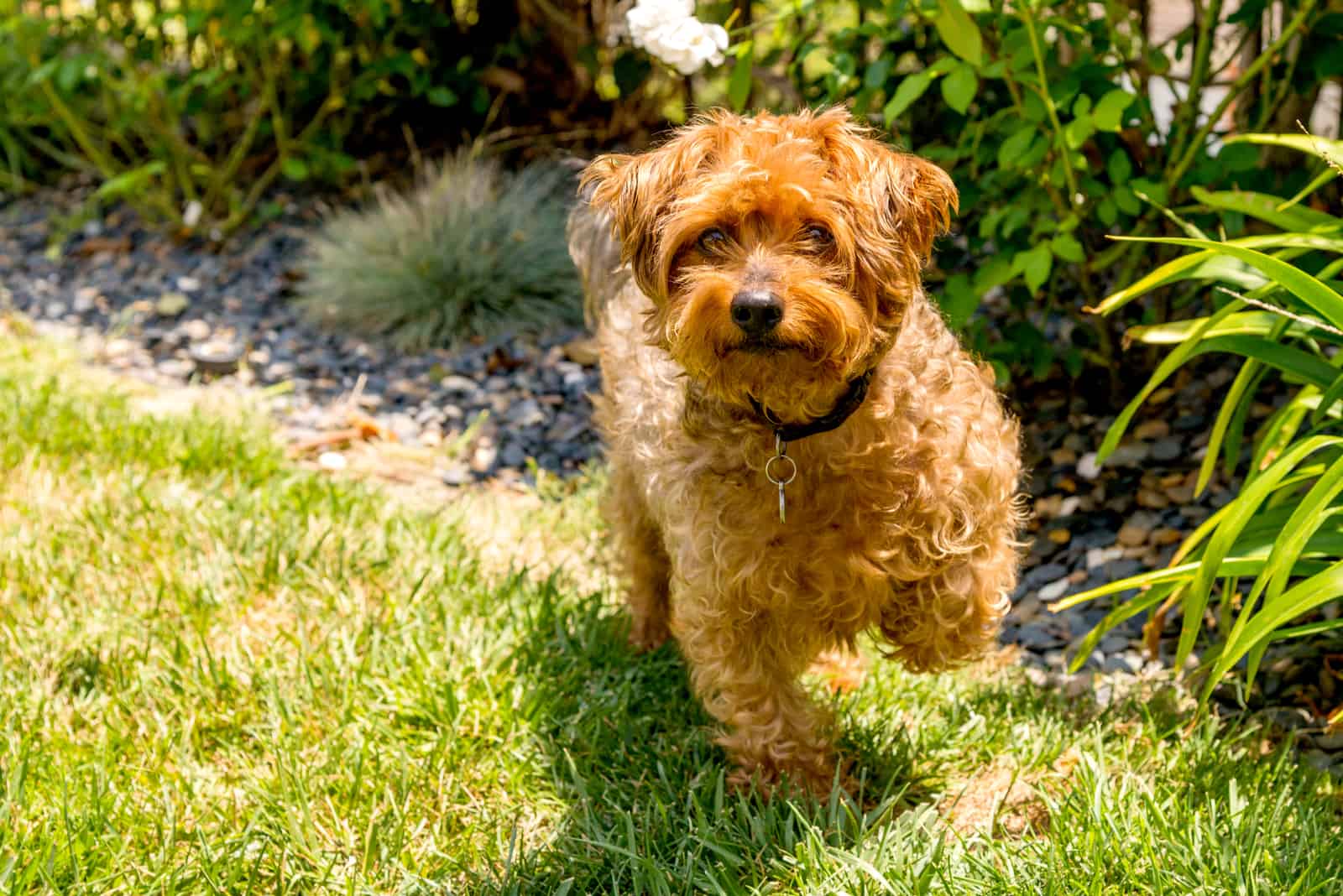
We should first explain what a Yorkie Poo is for those who don’t know!
This wonderful dog breed is a cross between the Yorkshire Terrier and the Poodle. As mentioned above, the Poodle is famous for its allergy-friendly coat.
As a result, breeders have experimented with various hybrids to produce a fantastic selection of hypoallergenic dogs, and the Yorkie poo is among them. In addition to the list of hypoallergenic breeds above, you can add most of the Doodle dogs (any breed crossed with the Poodle).
However, make sure you check this out before you buy, as crossbreeds can be unpredictable. A mixed-breed dog that inherits the other parent dog’s coat rather than the Poodle’s might not have the same allergy-friendly qualities.
Anyway, back to the Yorkie Poo. As you can guess, this beautiful little puppy is great for allergy sufferers because it inherits the hypoallergenic qualities of both parent breeds.
Another bonus is that they are unbelievably cute!
Tips On Living With Pet Allergies
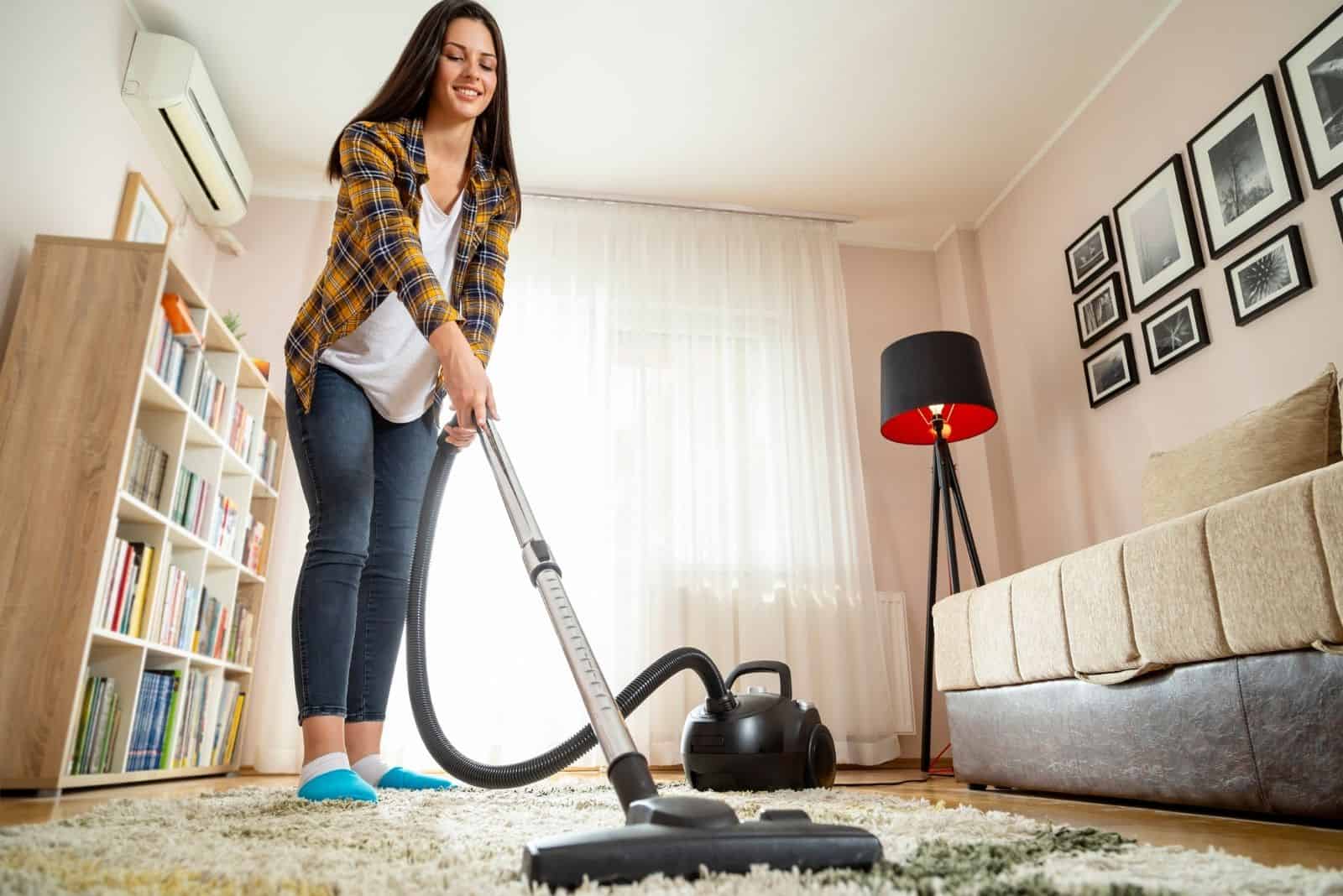
Many dog owners fail to realize that the strength of the allergic reaction varies from person to person. While some people might have a mild reaction to a particular dog breed, others may react severely.
Because of this, some people may still develop allergy symptoms when exposed to a hypoallergenic dog breed like the Yorkie.
However, don’t despair if you or any family members suffer from pet allergies. There are ways to reduce exposure to allergens in your home:
Vacuuming
You could consider investing in a powerful ‘pet hair’ vacuum cleaner with a HEPA filter that traps dust, pet dander, and pollen. Vacuuming your home two or three times a week will drastically limit your exposure to allergens.
Carpet sweepers and brushes won’t do the trick, and you need to clean thoroughly and get into every corner to get rid of dog hair and tiny particles of dried skin. Pet hair vacuum cleaners are designed to do exactly this job.
Grooming
A regular grooming regime is a part of being a responsible dog owner. It’s wise to brush your dog every day if it has a long show-coat or every other day if it has a clipped coat (like the puppy cut). This should ideally be done outside as bushing indoors risks sending dander all over the room.
Frequent brushing keeps the Yorkie’s coat free from tangles and stops its hair from getting stuck to your clothes and furniture. If brushing your dog aggravates your allergy, you can always take them to a professional groomer.
The Yorkie’s long coat will drag on the floor, accumulating dust, dirt, and pollen that can make allergies worse. Clipping their coat short will stop this from happening, and it looks cute!
Wash your Yorkie every couple of weeks to keep them clean and get rid of any saliva or dander that might cause allergies. This also helps keep their skin and coat healthy, especially if you use a good quality dog shampoo and conditioner.
Never use human shampoo as these aren’t designed for dogs and may strip away the natural oils in your dog’s skin.
Change Your Flooring
If you are able to do so, you might want to consider switching to laminate or hardwood flooring. Carpets and rugs attract dust, dog hair, and dander, whereas smooth surfaces can be washed down. Good quality hardwood floors are sealed with polyurethane varnish that stops microorganisms (like pollen and dander) from accumulating.
Dander and hair love to hide in nooks and crannies, so try to declutter your home. Curtains or drapes will also allow these pesky particles to accumulate, so they should be washed frequently or ideally changed for blinds that can be wiped down.
Hygiene
Washing your hands thoroughly after petting pooches is a good idea. While it may seem tedious or even excessive, the more times you remember to do this, the less chance allergens have to enter your body.
Millions of dog owners unwittingly touch their mouth, eyes, nose, and ears after touching their dogs, allowing allergens (and a host of other nasties!) to enter their bodies.
Dog saliva doesn’t just contain proteins that your body may react to, it also carries billions of bacteria that can make you sick. It’s best never to let your dog lick your face, especially around your lips.
Air Purifiers
You could invest in a good-quality air purifier that will filter out the allergens. You should also leave a window open for at least an hour a day to allow fresh air to flow through your room.
Puppy Hygiene
Wash your dog’s bedding out once a week to keep it fresh and clean. Not only will this reduce allergy symptoms, but it will also make them smell good! If you use a dog crate, wipe it down using a doggie disinfectant, and be sure to vacuum in there every so often.
Use Good Quality Dog Food
Your dog’s health plays a significant role in this. Its skin will be in good condition with the proper diet and won’t produce as much dander. Good quality dog food ensures that your pooch gets all the essential nutrition it needs.
Avoid giving your puppy sugary or salty treats, as these can dull the coat and cause various health problems that dry out the skin. Food allergies can also cause skin irritation, and your furry friend will scratch, producing more skin flakes.
Exercise
Don’t underestimate the value of a good long walk or playtime! Happy dogs tend to have healthier coats.
Bored, frustrated dogs become depressed, which affects them physically. Their coat becomes dull and greasy, and their skin is poorly conditioned and will produce more dry skin flakes.
Create ‘No-go Zones’
While it might seem cruel, having a pet-free space can be a real help. Your bedroom is an excellent place to set aside as it’s where you spend a lot of time.
If you let your dog sleep on your bed, you can be sure that it has left hair and dander (and possibly other things!) on your bedclothes.
You’ll be in close contact with these, and there’s little doubt that the allergens will get into your system at some point during the night.
Aside from all these tips, help is at hand in the form of antihistamines. You can get allergy medication over the counter at your local pharmacy or from your family doctor. Be sure to get non-drowsy medication if you can!
Also, you might want to book a visit to see an allergist for advice or even get an allergy shot. It all depends on how much the allergy is affecting your life.
If you have young kids, you might be worried that they may inherit your pet allergy. The good news is that most experts suggest that exposing children to animals at an early age is one of the best ways to ensure they don’t develop allergies later in life.
Hopefully, all of this information will be a comfort to anyone debating whether to get a dog because of concerns about allergies.
You may be able to lessen the impact of pet allergies by following these tips, and it’s worth doing some of them anyway, even if you have a hypoallergenic dog.
Before we finish, just a word of caution: this is general information only, and in no way does it constitute medical advice. You should always ask a medical professional for advice on coping with allergies. Always seek medical help if your allergy suddenly becomes worse.
Are Yorkies Hypoallergenic? The Final Verdict

Now you know what to say when anyone asks, Are Yorkies Hypoallergenic?
You also know that hypoallergenic dogs do exist, but there’s no such thing as an allergy-free dog, and that hypoallergenic qualities can’t be measured by percentage!
If you need to explain further, you can use your newfound knowledge to point out that it simply means that a dog is less likely to cause allergies.
There are several other breeds to choose from if you want a dog that doesn’t aggravate your allergy.
The key considerations to look out for are:
• Dogs that don’t produce a lot of dander. These dry skin flakes contain the proteins that are the biggest cause of dog allergies. Small dogs generally don’t produce as much as big dogs, but don’t rule out the Afghan Hound or the Giant Schnauzer as they’re definitely allergy-friendly!
• Dogs that don’t shed much. Remember, all dogs shed, even bald ones! Although it isn’t about shedding as such, loose hairs can carry dander. When hair falls off around the home, it sticks to your clothes, sofa, rugs, and any other fabric surfaces. Low-shedding dogs are best for allergy sufferers as it limits the dander in the home.
• Dogs that don’t drool. Dog saliva contains the same protein as dander. A dog that drools will leave pools of the stuff on your floor, especially around its food bowl or nearby where you’re eating. Even when it is dry, the allergen can live for hours or even days.
• Dogs that don’t clean themselves excessively. Sticking with saliva (not literally, of course), a dog that’s constantly licking its fur will leave a coating of dried saliva. As we saw above, the allergens can survive for a long time. And when you pet your dog, you’ll pick this up, potentially transferring it to your face.
But perhaps you’re not interested in another breed? It’s likely that you have your heart set on a Yorkie, and no other dog will do!
Don’t worry; it’s completely understandable. The wonderful Yorkshire Terrier qualifies as hypoallergenic on all counts, making it an ideal dog for families where pet allergies are the problem.
Armed with all this information, you can go ahead and get your Yorkie puppy, and you won’t have to worry about allergies making your life a misery!
Read Next:
• 12 Best Hypoallergenic Guard Dogs – No Sneezing On The Watch
• 7 Yorkie Breeders In Oregon Have Your Perfect Yorkie
• Are Yorkies Good With Kids: A Perfect Family Pet Or Not?

